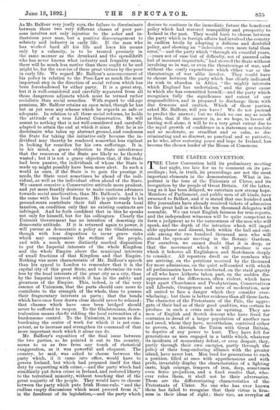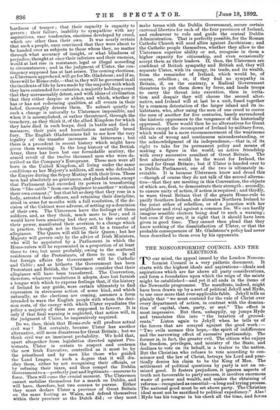THE ULSTER CONVENTION. T HE Ulster Convention held its preliminary meeting
last night, too late for us to comment on its pro- ceedings; but, in truth, its proceedings are not the most important elements in the demonstration. What is im- portant is the tone of the Unionists of Ulster, and its recognition by the people of Great Britain. Of the latter, long as it has been delayed, we entertain now strong hope. Members of Parliament, and public men of all kinds, have swarmed to Belfast, and it is stated that one hundred and fifty journalists have already received tickets of admission to the great hall in which the ten thousand delegates will assemble. We can trust English fairness for true reports, and the independent witnesses will be quite competent to form a judgment as to the earnestness of the men who will speak, and the depth of the intention which will impel alike applause and dissent, both within the hall and out- side among the two hundred thousand men who will attend the open-air meeting in the Botanic Gardens. For ourselves, we cannot doubt that it is deep, or that the movement which it will produce is one which it behoves all Englishmen and Scotchmen deeply to consider. All reporters dwell on the numbers who are arriving, on the petitions received by the thousand for more admissions, on the quiet self-control with which all preliminaries have been conducted, on the staid gravity of all who have hitherto taken part, on the sudden dis- appearance of the differences, often violent, which have kept apart Churchmen and Presbyterians, Conservatives and Liberals, Orangemen and men of moderation, now all united to face a danger which they consider over- whelming; but there is better evidence than all these facts. The character of the Protestants of the Pale, the aggre- gate of their bad as of their good qualities, was certain to produce in such a crisis such an uprising. They are men of English and Scotch descent who have lived for centuries in dread of a larger population of another race and creed, whom they have, nevertheless, contrived either to govern, or, through the Union with Great Britain, to deprive of any power to hurt. They have felt for generations as men engaged in a battle which, whatever its incidents of momentary defeat, or even despair, they, partly through their own energies, partly through the policy of their long-enduring alliance with the greater island, have never lost. Men bred for generations to such a position, filled at once with apprehensions and with pride, invariably display the characteristics of a fighting caste, high courage, tempers of iron, deep, sometimes even fierce prejudices, and a fixed resolve that, who- ever rules them, it shall not be their adversaries. Those are the differentiating characteristics of the Protestants of Ulster. No one who has ever known them has failed to recognise that their virtue is firm- ness in their ideas of right ; their vice, an overplus .st hardness of temper ; that their capacity is capacity to govern ; their failure, inability to sympathise with any aspirations, race tendencies, emotions developed by creed, which are other than their own. It was nearly certain that such a people, once convinced that they were about to be handed over as subjects to those whom they, no matter through what accuracy of insight, or what blindness of prejudice, thought at once their inferiors and their enemies,. would at last rise in resistance, legal or illegal according to circumstances ; and. in the judgment of Ulster, the con- tingency supposed has at last arisen. The coming elections, as Ulstermen apprehend, will go forMr. Gladstone; and if so, there will be Home-rule,—that is, they will be governed in all the incidents of life by laws made by the majority with which they have contended for centuries, a majority holding acreed -that they unreasonably detest, and with ideas of civilisation -that they either despise or abhor, and which, whether it has or has not redeeming qualities, at all events in their .belief, thoroughly detests them. To submit quietly to such a change is naturally to Ulstermen impossible, and when it is accomplished, or rather threatened, through the 'treachery, as they think it, of the allied Kingdom for which they have died in such heaps, died in battle and died, in massacre, their pain and humiliation naturally breed fury. The English Gladstonians fail to see how the very legality of the transfer increases its bitterness ; but there is a precedent in recent history which might have given them warning. In the long history of the British Army, there has been but one formidable mutiny, the armed revolt of the twelve thousand men who were de- scribed as the Company's Europeans. These men were all born in the United Kingdom, all living under the same .conditions as her Majesty's soldiers, all men who defended the Empire during the Sepoy Mutiny with their lives. These men had absolutely no grievances, and pleaded none, except that Parliament had exceeded its powers in transferring them "like cattle "from one allegiance to another" without their own consent ;" but that bit so deep that they rose in a body, arrested their officers, and retaining their discipline, stood in arms for months with a full resolution, if the de- cision of the Cabinet were adverse, of setting up a dominion of their own. The Ulstermen have the feelings of those soldiers, and, as they think, much more to fear; and it would have been amazing had they not, to the extent of their power, manifested their aversion to a change which in practice, though not in theory, will be a transfer of .allegiance. The Queen will still be their Queen ; but her Majesty will govern only by the advice of Irish Ministers, who will be appointed by a Parliament in which the Home-rulers will be represented in a proportion of at least three to two, but more probably, owing to the scattered residences of the Protestants, of three to one. In all but foreign affairs the Government will be Catholic and Celtic ; and as hitherto the Government has been Protestant and British, the Ulstermen consider that their allegiance will have been transferred. The Convention, therefore, whatever resolutions it adopts, does but furnish a tongue with which to express feelings that, if the history of Ireland be any guide, were certain ultimately to find expression in strenuous action of some kind, and which naturally, as the elections are coming, assumes a form intended to warn the English people with whom the deci- sion rests, of the energy with which Ulster repudiates the policy a majority of them are supposed to favour. It is only if that final warning is neglected, that action will, in the judgment of Ulster, be imperatively required.
Do we, then, think that Home-rule will produce actual civil war ? Not certainly, because Ulster has another alternative, still more disastrous for Great Britain ; but we think civil war an imminent probability. We hold that, apart altogether from legislation directed against Pro- testants, Ulster is certain to suspect and contemn -the new Irish Executive, controlled as it must be by the priesthood and by men like those who guided the Land League, to such a degree that it will dis- obey them, either by not recognising their officials, or by refusing their taxes, and thus compel the Dublin Governmentto a—perfectly just and legitimate—recourse to force. Then will come the crucial moment. The Ulstermen cannot mobilise themselves for a march on Dublin, and will have, therefore, but two courses to pursue. Either they must declare Ulster a province of Great Britain on the same footing as Wales, and defend themselves within their province as the Dutch did ; or they must make terms with the Dublin Government, secure certain cantonal liberties for each of the four provinces of Ireland, and endeavour to rule and guide the central Dublin Administration. That is perfectly possible, for the Roman Catholic Church will need allies against Jacobinism ; and the Catholic people themselves, whether they allow to the Ulstermen superior ability or not, recognise in them a higher capacity for citizenship, and even occasionally accept them as their leaders. If, then, the Ulstermen are confident of British sympathy and British aid, they will separate Ulster, with its energy, its trade, and its wealth, from the remainder of Ireland, which would be, of course, rebellion ; or, if they find no sympathy in Britain, if, on the contrary, a Radical Government threatens to put them down by force, and, lands troops to carry the threat into execution, then in irrita- tion and despair they will choose the second alter- native, and Ireland will at last be a unit, fused together by a common detestation of the larger island and its in- habitants, who, after using the men of one creed to coerce the men of another for five centuries, basely surrendered the historic oppressors to the vengeance of the historically oppressed. There would then be no alternatives for Great Britain except the reconquest of Ireland by military force, which would be a mere recommencement of the wearisome old tale of wrong and continuous misunderstanding, or the acknowledgment of its independence,—that is, of its right to take for its permanent policy and means of making a figure in the world, an active friendship with every successive assailant of Great Britain. The first alternative would be the worst for Ireland, the second for Great Britain ; but if Ulster is handed over to a Dublin Parliament, one of the two is ultimately in- evitable. It is because Ulstermen know and dread this —though of course they do not talk of the second alterna- tive—that they are meeting in this Convention, the objects of which are, first, to demonstrate their strength ; secondly, to ensure unity of action, if action is required ; and thirdly, to warn Great Britain that if she grants Home-rule to pacify Southern Ireland, she alienates Northern Ireland to the point either of rebellion, or of a junction with her neighbour and rival against a common foe. We can hardly imagine sensible electors being deaf to such a warning ; but even if they are, it is right that it should have been given in good time. They cannot then plead that they knew nothing of the dissatisfaction of Ulster, or that the probable consequences of Mr. Gladstone's policy had never been described to them even by his opponents.







































 Previous page
Previous page